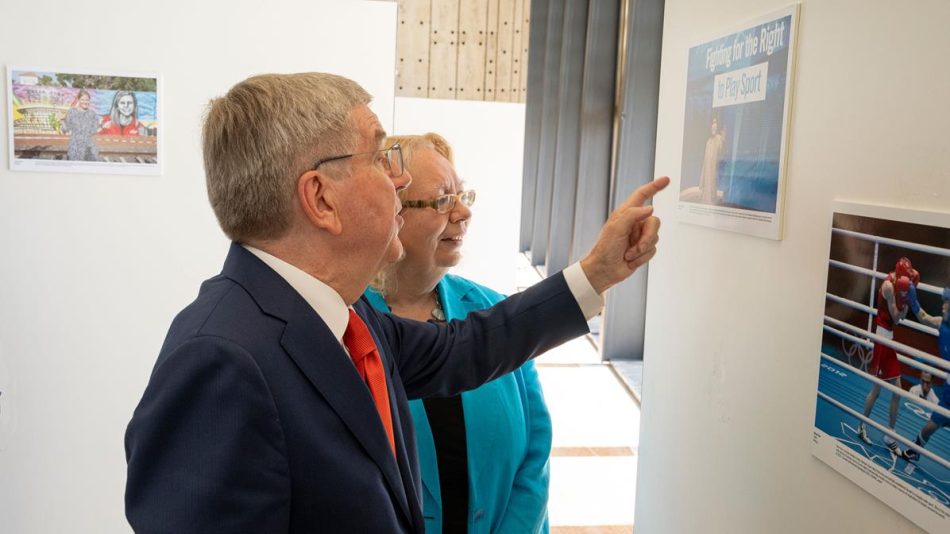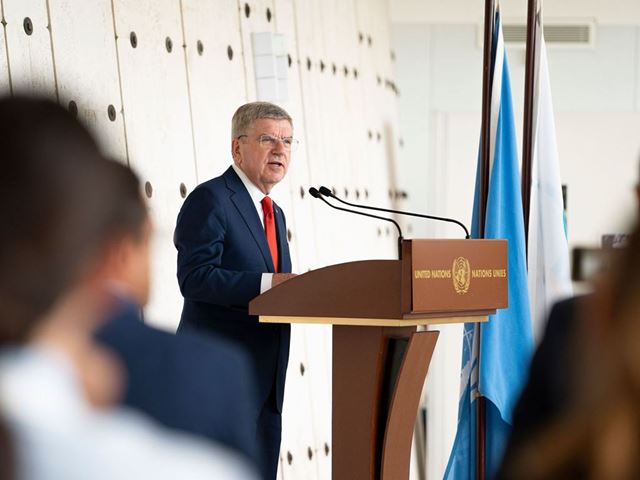UN and IOC celebrating the women reframing sport in new exhibition at the UN Office in Geneva

International Olympic Committee
18 Jul 2023 – Illustrating the power of sport to act as a driver of gender equality, the “Breaking Barriers Through Sports” photo exhibition was inaugurated today at the United Nations Office in Geneva (UNOG), including portraits contributed by the International Olympic Committee (IOC) of female role models who are tackling gender inequality in sport, both on and off the field of play.
This new collection is a spin-off of the “Not a Women’s Job?” exhibition, launched by UNOG in 2022, with photos featuring women around the world who have contributed to breaking down barriers and stereotypes in professions traditionally associated with men. Women from the world of sport are now joining the astronauts, firefighters, engineers and others, with the collection of photos submitted by the IOC of sporting game-changers.
Inspirational figures from around the world
Representing women from 26 countries, all five continents and 18 sports, the collection aims to inspire new generations to challenge negative stereotypes. Six categories from the world of sport are highlighted: high-performance athletes; grassroots sport; entourage; sports administration; sports media and broadcasting; and sports science and academia.
The breadth of the categories is indicative of the intent to celebrate all those involved in sport, both on and off the field of play. Among those showcased in the photos are athletes, coaches, officials, administrators, community leaders and media representatives – each one of them strong female role models.
Among the new figures highlighted in the exhibition are three Olympian IOC Members who are paving the way for future generations:
Anita DeFrantz: American Olympic rowing bronze medallist Anita DeFrantz has been an IOC Member since 1986 and was the first woman elected as IOC Vice-President. As the former Chair of the Women and Sport Commission, she has helped drive the IOC’s efforts in advancing gender equality and the fight for non-discrimination.
Nawal El Moutawakel: IOC Executive Board member Nawal El Moutawakel made history at the Olympic Games Los Angeles 1984 when she became the first Moroccan, African and Muslim woman to win an Olympic gold medal. Earning her instant recognition in her country, it was the breakthrough that gave Moroccan women much-needed self-belief and the courage to take up sport, which had previously been regarded as the preserve of men.
Kirsty Coventry: Five-time Olympian and a two-time Olympic champion in swimming from Zimbabwe, Kirsty Coventry is Africa’s most decorated Olympic athlete. Now a successful sports leader, Coventry is an IOC Member active in several IOC commissions and Minister of Youth, Sport, Arts and Recreation in her home country.
Others sports women featured include American bobsledder Elana Meyers Taylor, who, with five Olympic medals, is the most decorated black athlete in Olympic Winter Games history; Argentina’s Nerea Livoni, South America’s leading female rugby referee; and Seiko Hashimoto, President of the Tokyo 2020 Organising Committee and the world winner of the 2021 IOC Women and Sport Awards.
Breaking new ground for women
Contributing to the exhibition is an opportunity to honour and celebrate some of the inspirational figures who are breaking new ground for women at all levels of sport.
At the inauguration of the exhibition, held at the Palais des Nations in Geneva on 18 July, IOC President Thomas Bach highlighted the important role sport can play in promoting positive social change.
“Sport and especially the Olympic Games, are an incredible platform to showcase women as inspirational role models. In sport, everyone is equal. The Olympic Games bring all people together in peaceful competition without discrimination: regardless of gender, sexual orientation, social status, religion or political belief. This gives sport the capacity to challenge social norms and pave the way for a more equal and inclusive society,” said President Bach. “The women and their personal stories in this exhibition are perfect examples of this potential becoming a reality.”

Building a better world through sport
The “Breaking Barriers Through Sports” exhibition is just one part of the IOC’s wide-ranging collaboration with the UN and other stakeholders on promoting gender equality.
Significant progress has been made in the world of sport – with Paris 2024 set to break further new ground as the first Games to achieve full gender parity, with the same number of female and male athletes.
Off the field of play, there has been progress as well. As a result of the IOC’s Olympic Agenda reforms, female participation in the IOC commissions has more than doubled. For the first time, an equal number of positions are being held by men and women across the IOC commissions. For comparison: before the reforms took effect, women accounted for only 20 per cent of positions.
Also thanks to these reforms, around 40 per cent of IOC Members are now women. This is up from 21 per cent from before Olympic Agenda 2020.
While great progress has been made at the IOC and the Olympic Games, women and girls continue to face obstacles, inequalities and prejudice, including limited opportunities and fewer resources. In order to continue closing the gender gap on and off the field of play, IOC President Bach reiterated the need for stakeholders to work together to leverage the unique power of sport as a driver of social change: “If we truly want to ensure gender equality and empower women in sport, not only as athletes and role models, but also as coaches, officials and leaders, then everyone has a role to play: the athletes, the International Sports Federations, the National Olympic Committees and all our other partners in society.”
The “Not a Women’s Job? / Breaking Barriers Through Sports” exhibition is open to the public at the Palais des Nations in Geneva, and is also accessible online via the UN Office at Geneva website





